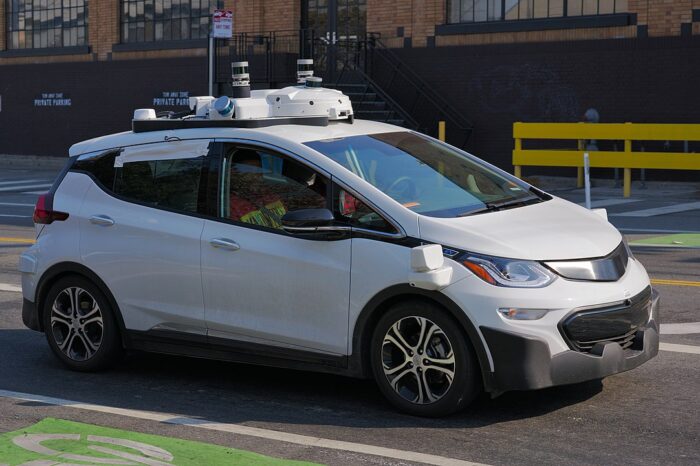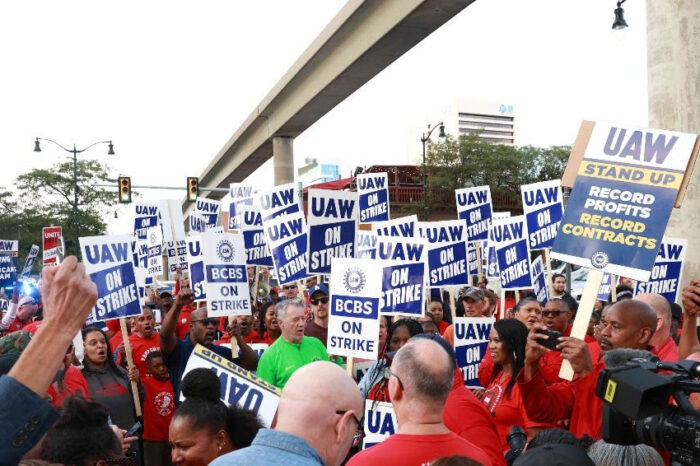Like millions of Americans, hundreds of transit agencies across the U.S. are eagerly awaiting their check after passage of the $1.9 trillion American Rescue Plan. But unlike many of us, few transit agencies have the luxury of throwing their stimulus checks into savings: the $30.5 billion may not even be enough to maintain existing service. Over in the private sector, meanwhile, there’s ever-more EV news: a new GM joint venture to build a super-battery, a bubbly-looking EV pick-up truck by Canoo, the impending death of the car dealership as we know it, accusations of fraud at Lordstown and a bold prediction that VW will soon overtake Tesla as the world’s top EV seller.
![]()
The American (transit) Rescue Plan: Transit agencies across America are breathing a lot easier after Congress approves the American Rescue Plan. The $1.9 trillion package includes $30.5 billion to shore up the budgets of pandemic-battered local transit agencies. Just over a fifth of the total — $6.5 billion — is going to NYC’s MTA, America’s largest transit agency, prompting it to lift a pay freeze for employees. Other big winners include D.C.’s WMATA ($1.9 billion), LA’s Metro ($1 billion) and the three agencies serving Chicagoland ($1.5 billion). Still, the total aid for transit is about $9 billion shy of what the American Public Transportation Association says is needed to maintain existing level of service.
Oh Lordstown! Notorious short seller Hindenburg Research sets its sights on Lordstown Motors, after previously gunning for other automotive upstarts like Nikola and Kandi. Hindenburg makes a number of bold claims, accusing the aspiring electric truck maker of grossly inflating the number of pre-orders and overrepresenting the state of its technology. Hindenburg alleges that multiple former employees of the company describe founder Steve Burns (who previously led Workhorse Motors) as a “conman” or a “PT Barnum figure.”
What will EVs do to car dealerships? The coming years will force car dealerships to rethink their business models. EVs simply don’t require as much maintenance as their gas-powered counterparts, depriving dealers of a lucrative business to justify their sprawling lots and big staffs. The new normal may look like Polestar, the all-EV Chinese / Swedish car brand that mostly relies on customers shopping online. Even ahead of the EV revolution, many automakers are already shifting to a greater emphasis on shop-click-drive.
Canoo’s new pickup: Los Angeles-based EV startup Canoo’s stock shoots up 14% Thursday after the company unveils an electric truck whose unique build is drawing comparisons to 50s era pick-ups. The truck, whose 200-mile range falls well behind that of the Hummer EV (350 miles) and the Tesla Cybertruck (250 miles), is not expected to come to market until 2023. Add in Rivian’s forthcoming EV pickups to that list, and it looks like the market is serious about work-ready electric vehicles.
GM finds a battery partner: In pursuit of a battery that can power a car for 500 to 600 miles on a single charge, GM teams up with SolidEnergy Systems, the Singaporean maker of lithium metal batteries. The joint venture plans to build a manufacturing prototype line in Woburn, Mass., near SolidEnergy’s existing facilities in Boston.
UBS bets on VW: The Swiss banking giant’s most recent auto industry forecast shows that by 2025 EVs will be no more costly to manufacture than gas-powered cars. Furthermore, says UBS, EVs will account for virtually all new car sales by 2040. As for the companies positioned to be most dominant, the bank believes Tesla will remain one of the top two players in coming years — but that VW will surpass it in total sales volume as early as next year.
While Toyota warns Apple: Toyota chief Akio Toyoda warns the American tech giant to brace for “40 years of responding to customers and various changes” when it enters the auto industry. His comments underscore hesitation among traditional automakers to partner with Apple on building an autonomous EV. After talks with Hyundai fell through, it looks increasingly likely that Apple will opt for a contract manufacturer, such as Foxconn or Magna, rather than an established automaker.
Lithium prices skyrocket: The surge in interest for EVs is driving up the price of lithium, the key ingredient for EV batteries. The price of lithium carbonate in China, where much of the material is mined, now stands at $11,250 per metric ton, a 68% increase since the beginning of the year.
Quick cash for quick startup: Berlin-based grocery delivery startup Flink (German for “quick”) raises $52 million in a seed financing round led by Target Global, Northzone, Cherry Ventures and TriplePoint Capital, bringing its total raised to $64 million. The startup claims it can deliver groceries from a network of depots in 10 minutes, one-upping the 15-minute delivery promised by London-based Weezy. Bold claims are the name of the game in the increasingly crowded delivery space…
Compliance = convenience: Beijing’s subway system considers putting China’s notorious social credit system to use by allowing those with high credit scores to bypass security checks at the entrance of train stations. In a potential trial run, passengers without records of rules violations in the subway wouldn’t have to get their bags checked, thus creating an incentive for people to obey rules forbidding eating on trains, among many others. Calling George Orwell…
A bright future for highways: The Netherlands is considering building a major solar plant parallelling a highway in the northeastern part of the country. For several years now the government has eyed state-owned land along highways as prime real estate for new solar infrastructure. Perhaps the next step is getting solar panels on the cars themselves…
Houston has had enough: Harris County, home to Houston, is suing the Texas Department of Transportation in an effort to halt a planned $7.5 billion expansion of I-45, a major highway that runs north-south through Texas’ largest city. County Judge Lina Hidalgo, the 30-year-old rising progressive star who holds the county’s top position, says the state needs to “stop putting cars over people.” A similar state “congestion relief” project a decade ago gave Houston the widest highway in the country, the 26-lane Katy Freeway, but — surprise, surprise — traffic only got worse.
Via’s new Remix: Via, the on-demand transit provider, purchases transportation SaaS provider Remix for $100 million. In last week’s CoMotion LIVE episode, Via’s Europe CEO Chris Snyder says the merger will give Via access to data to better-serve its many transit agency partners.
Portland breaks up with Replica: A disagreement over privacy leads Portland Metro, the city’s regional transportation planning agency, to end its partnership with Replica, the San Francisco-based mobility data firm. The agency wanted Replica to provide raw data on user movement gleaned from mobile devices the firm collects, before being ianonymized. The firm objected, saying such a move would threaten user privacy. This is the latest in a push-and-pull between governments, private companies and privacy advocates over the amount of data that the public sector should have access to. Hence our recent interview with Los Angeles’ top transportation official, Seleta Reynolds, over a court ruling that upheld the city’s right to collect real-time mobility data.
![]()
Tesla contradicts Musk: Newly-surfaced documents that Tesla submitted to the state of California in December concede that neither of the car-manufacturer’s existing driver assist features amount to an “autonomous system.” Moreover, in contrast to CEO Elon Musk’s bold prediction that the company would achieve Level 5 autonomy by the end of 2020 (he’s now saying 2021), Tesla general counsel Eric C. Williams says, “we do not expect significant enhancements” to the system, which he describes as Level 2, in the near future.
ByteDance backs QCraft: The Chinese company that owns TikTok invests $25 million into QCraft, a Beijing-based AV startup that claims its simulation-based approach to building autonomous technology will result in substantial cost-savings.
Zoox is coming: Zoox CEO Aicha Evans says the AV startup will have its bidirectional robo-taxis in use “a lot sooner than people imagine,” although she admitted that next year would be too soon. Evans also said it was likely that the technology would become part of parent company Amazon’s package delivery operation.
 Ola la! Bhavish Aggarwal, the founder of Indian ridesharing company Ola, is planning to build a $330 million e-moped plant outside of Bangalore that he hopes will eventually crank out 10 million vehicles a year. The vehicles will be available internationally, but India itself accounts for a big chunk of the target market due to the popularity of mopeds in the nation’s congested urban streets.
Ola la! Bhavish Aggarwal, the founder of Indian ridesharing company Ola, is planning to build a $330 million e-moped plant outside of Bangalore that he hopes will eventually crank out 10 million vehicles a year. The vehicles will be available internationally, but India itself accounts for a big chunk of the target market due to the popularity of mopeds in the nation’s congested urban streets.
A Porsche for only ten grand: The automaker has come out with two new e-bikes: the eBike Sport road bike, for about $13,000 and a multi-terrain model, the eBike Cross, for around $10,000. While many car-makers have simply attached their brand to e-bikes built by other companies, Porsche actually built these itself. Unlike the brand’s cars, Porsche e-bikes do not boast a particularly impressive speed. The eBike Sport only offers pedal assist up to 15.5 mph, making it street-legal in many European cities that strictly regulate e-bike speed — but keeping it way below the top speeds of many more modestly-priced peers.
Scooter spending: New research from Emory University reveals that shared micromobility systems translate into big bucks for local economies. The study looked at four major cities, and found that the local shared scooter systems translated into an additional $13.8 million in positive economic spillover growth. Maybe these new findings will encourage cities to add some more bike infrastructure to actually make biking / scooting safe and comfortable?
![]() Shoutout Miami talks with our own Jonah Bliss about why he’s excited about the future of transportation in the Magic City.
Shoutout Miami talks with our own Jonah Bliss about why he’s excited about the future of transportation in the Magic City.
The Moscow Times profiles Yelena Lysenko-Saltykova, Russia’s first woman commuter train driver, a position that until January was denied to women by Soviet-era laws aimed at keeping women out of physically demanding jobs.
Bloomberg CityLab takes a look at the transformation of pick-up trucks from “no frills workhorses into angry giants.

A return trip: Brightline Holdings, operator of South Florida’s innovative train service, names Mike Reininger as CEO. While he’s incoming from Saudi Arabian entertainment company Qiddiya Investment Group, he’ll be a familiar face at Brightline: he previously served as the company’s President and Chief Development Officer from 2012 to 2018.
Jobs the world over: Bolloré, the French transportation giant that operates Blue Systems, has job openings all across the globe. Take a look at some career listings spanning from the Ivory Coast, to Vietnam, to Hamburg, and everything in between.
Moov on over: Looking for a career in Israel? Our friends at Moovit have a number of job openings, including positions for Technical Writers, Engineers, and Operations Managers.
Populus positions: Armed with an additional $5 million from a recent investment round, Populus, the rapidly-growing mobility data platform, plans to triple the number of cities it operates in over the next 18 months. Right now there are eight positions open at its San Francisco headquarters in engineering, growth, marketing and operations.
Have a job listing that’s perfect for the CoMotion community? Please send it to jbliss@comotionglobal.com.
Enjoy the Week in Review? Get it delivered directly to your inbox by signing up for the CoMotion>>NEWS newsletter.






